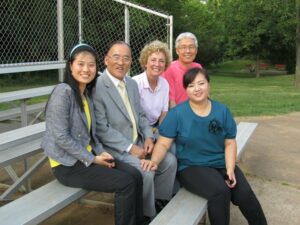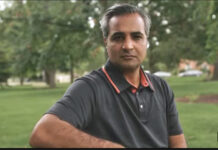By Mark Ellis —

One by one her family members fell, either by starvation or at the hands of a brutal regime. In their arduous journey to freedom, they found a “filling” on levels they could not have imagined.
“We grew up as atheists,” says Jin Hye Jo, 24, now living in northern Virginia with her sister, Eun and her mother Han. They are the only known survivors of a family of eight people. Her grandmother died from starvation before her eyes, her last wish to eat one steamed potato.
In the 1990s, extended drought and the fall of the Soviet Union meant the family no longer received food rations from the government. They were forced to forage for food wherever they could find it. They stripped the bark off pine trees, grazed for grass, and ate corn cobs, which they ground into bland cakes. They stalked anything that moved or slithered on the ground.
Incredibly, they were taught to believe the communist party kept them alive. Their leaders said it was the fault of the United States and South Korea that they faced such privation and hardship.
By 1997, Jin Hye’s father and mother, Jo and Han, had reached the breaking point. They decided to risk a crossing into China to find food. They planned to make contact with a nephew there, and then return home with whatever they could carry.
After they made the crossing, they were shocked to see the relative abundance of food in China. They returned after a week with sacks full of rice. They made two more trips across the border, but unfortunately, a neighborhood informant reported their clandestine excursions to the authorities.
Father and mother arrested and mistreated
Jin Hye’s father, Jo, was arrested immediately and the family never saw him again. The next day, officers came for her mother. At the police station, they forced her to kneel in front of them, then they kicked her and beat her with a wooden rod. The beating shattered Han’s skull in four places.
They told her to lay her hands flat on the cement floor and then stomped on them with their boots. Inexplicably, they released her. Han thinks their “mercy” may have been caused by the recognition she was pregnant.
Jin Hye later learned her father died on a prisoner train after he was forced to stand with his arms tied over his head for 10 days without food or water. “The regime couldn’t feed their people and couldn’t feed prisoners,” Jin Hye notes with sadness.
On her mother’s return from the police station, she saw the police had confiscated all the rice they carried from China. Jin Hye’s 18-year-old sister decided she would go to China to find food for the family. They never saw her again and believe she ended up in the hands of human traffickers.
“She was sold to a trafficking ring, will probably never come back to our family and I don’t even know if I will ever meet her again while I am still alive,” Jin Hye laments.
A few months afterward, Han gave birth to a boy. Despite the risks, Han decided to make another trip to China for food. She would also see if she could track down her missing daughter. “While my mother was gone, the baby died in my arms of starvation,” Jin Hye says. “He was waiting for our mother’s bosom to come back and feed and nourish him, but he could not wait.”
A family decimated
Two months later, Han returned with food, but she found her baby and her 76-year-old mother dead from starvation. In less than a year, the family had had been cut in half.
It is the policy of the North Korean government to punish the extended family of anyone who violates the law. Perhaps they should not have been surprised when officers showed up one night in 1998, and told them they must move out of their house or the authorities would burn it down.
A few days later, homeless, with no place to turn, Han gathered her three surviving kids – Jin Hye, then 11, Eun, 7, and BoKum, 5 — and started the 100-mile walk to the Chinese border.
“Since we had no shoes on, our feet soon developed blisters and started bleeding, and we were weak from hunger; our own mother had suffered torture in prison and was in no condition to look out after the three of us,” Jin Hye notes.
They stopped in a village to spend the night with a friend, a widow trusted by the family. Because they had two mountains to cross, as well as the Tumen River, they decided to leave the five-year-old, BoKum, with their friend. Han promised she would bring the widow rice and food in exchange for watching him.
“Why are you taking my sisters, but not me?” BoKum cried out the next morning. He began to wail as he tugged on his sister’s pant leg. They promised they would return for him in five days. To ease his mind, they gave him a ground corn cake and promised him candies and cookies upon their homecoming.
But they met an unfortunate delay in China and could not get back at the appointed time. The Tumen River had become a rushing torrent with the recent rains, impossible for them to cross since they didn’t know how to swim. During their forced layover, they hid in fields and stole squash and corn from farms to survive.
Meanwhile, they had no way to communicate with their friend watching BoKum. The widow couldn’t continue to feed the child, since she was practically starving herself, so she kicked him out of her house to fend for himself.
He died in a field of reeds crying out, “Mother, when are you coming back,” they discovered later. When Han learned her son was dead, she felt her heart had been ripped out of her chest.
“To this day I am so sorry for not bringing him with us, and I miss him dearly every day,” Jin Hye says.
Han and her two daughters decided to stay in China; it was their only hope. During the first few years there, they struggled to survive.
Living underground in China
One day, Jin Hye was walking down a hill and she heard some strange music coming from a hut. It was a Christian hymn, something she never heard before. The hymn was, “Father I stretch my hands to Thee,” written by Charles Wesley and W. Shield, sung to the tune of ‘Auld Lang Syne.’
Mesmerized by the words and the music, she stood there a few moments. “As I listened, an elderly grandmother came out of the hut and told me, ‘This is a place for people who are tired and weary; you can find spiritual guidance and healing here.’
“I came into contact with missionaries and began to attend an underground Bible school,” Jin Hye says. As she began to immerse herself in God’s Word, memorizing Bible verses, the Word and the Spirit tenderized her heart.
It wasn’t long before Jin Hye accepted Jesus Christ as her Lord and Savior. “I was prayed for by other Christians, and I felt the Holy Spirit come over me, and I knew I was a child of God.”
However, Han’s atheistic indoctrination made her resistant to her daughter’s newfound faith. “If you become a Christian, you will no longer be my daughter,” she told her.
A memorable dream
Jin Hye began to pray for God to soften her mother’s heart. One night, Jesus appeared to Han in a dream. “If you believe in Me, I will give you gifts,” the Author of Salvation told her.
Han’s attitude made a dramatic reversal after her encounter with Jesus and she began to attend church herself, and later found a vibrant faith in Christ. Jin Hye’s sister, Eun, also came to know Jesus as her Savior.
Han and her daughters hid in China for 10 years. First they stayed with relatives and then with friends. They also received help from Korean missionaries.
They were caught by Chinese authorities and sent back to North Korea several times. Authorities sent them to orphanages or re-education camps, but each time they escaped or bribed their way to return to China.
In China, the family was befriended by Phillip Buck, a Korean-American pastor and missionary helping North Korean defectors. When all three were repatriated in 2006, Buck paid North Korean security agents $10,000 to let them escape once again.
This time, after hiding in China for two months, Han and her daughters went to the United Nations High Commissioner for Refugees in Beijing and asked to live in the United States. After 16 months of waiting, their application was approved and they arrived in the U.S. in 2008. They were granted asylum and have become permanent U.S. residents.
Today, Han works night shifts, taking care of senior citizens for a home health care agency. Both daughters have office jobs at the same health care agency and attend night school.
JinHye would like to study theology and become a missionary to the North Korean people some day. “When it’s reunited, I would like to go back to North Korea and preach God’s Word to my people.”
If you want to know God personally, go here




This is such a sad story in the beginning, but a wonderful story of survival, and the will to live under extreme hardship. I’m so happy they found JESUS and salvation. My heart melts for the people of the world who need to know our Savior.
Thank you for this story that is so incredibly sad and speaks of the suffering beyond our imagination. May we stand up for the freedom we have and not take it for granted. Courageous people they were.
Comments are closed.